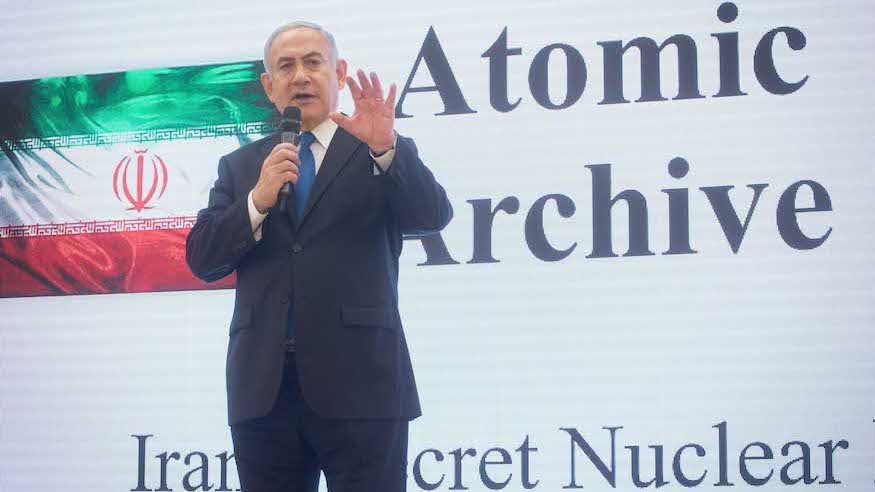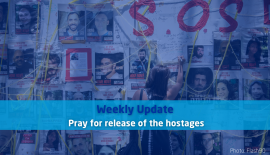Israel’s Greatest Threat is Iran
Israel’s security situation remains the number one topic on the political agenda in the Jewish state.
There have been huge changes in the last eight years following the beginning of what has been dubbed ‘The Arab Spring’, the (Islamist) uprising against regimes across the Middle East. Israel managed to stay out of the Syrian fray to a certain extent and has improved its ties with a range of Arab countries while at the same time has been battling the growing Iranian entrenchment in Lebanon, Syria and the Gaza Strip.
In 2018 it became clear that the Israeli military has shifted its focus from counter- terror operations to sophisticated and intelligent warfare aimed at trimming Iran’s growing influence in the Middle East. Israeli leaders, including PM Netanyahu and the top brass of the Israel Defense Forces (IDF), started to discuss openly what the IDF and the Israeli air force (IAF) were doing against the growing Iranian threat to the Jewish state.
At the same time, there have been reports of multiple airstrikes against Iran-related targets in Syria.
The goal of this relentless campaign was to stop the Iranian military build-up in Syria and Lebanon.
On 10 May 2018, the first confrontation took place between the Quds Force of the Iranian Revolutionary Guards Corps in Syria and the IAF, which changed the way Iran acted in the war-torn country.
After Qassem Soleimani, the shrewd commander of the Quds Force, ordered the launch of 30 missiles at northern Israel, the IAF reacted by launching a devastating bombardment which destroyed 80 targets linked to the Quds Force and the Syrian army. In one fell swoop, the IAF delivered a devastating blow to the Iranian axis in Syria, and continued after that by targeting every delivery of sophisticated weapons to the Iranian axis, Hezbollah in particular.
The latest IAF action in Syria took place in the night of 13 January 2019, when Israeli warplanes bombed weapon storage facilities in the vicinity of Damascus International Airport.
In a departure from standard procedure, Prime Minister Netanyahu openly admitted that Israel had bombed weapon storages. At the start of the weekly cabinet meeting on Sunday 13 January 2019, Netanyahu made the following statement:
“Just in the last 36 hours, the air force attacked Iranian warehouses with Iranian weapons at the international airport in Damascus. The accumulation of recent attacks proves that we are determined more than ever to take action against Iran in Syria, just as we promised.”
Outgoing IDF Chief of Staf Gadi Eisenkot, furthermore, revealed that as a result of the IAF campaign against Iran in Syria Soleimani decided to pull out his troops from the border region with Israel.
At about the same time, the Quds commander shifted his focus from Syria to Lebanon and Gaza.
Iranian civil planes started to deliver weapons bound for Hezbollah directly via Beirut International Airport. The Quds Force had reportedly been assisting Hezbollah with the conversion of crude rockets into GPS guided missiles on Lebanese soil.
After Netanyahu exposed Iran’s activities in Lebanon and revealed the existence of a network of terror tunnels underneath the border with Israel, it became clear that this part of the Iranian plan to start a multiple-front war against the Jewish state had failed as well.
Then there was Gaza, where Hamas reconciled with the Islamist regime in Tehran at the end of 2017.
This reconciliation, and the forming of a new militia in Gaza by the Quds Force, based on the Hezbollah model, caused the so-called Kite Jihad which destroyed thousands of acres of forests and agricultural fields in southern Israel during the summer of 2018.
At the beginning of November 2018, Iran ordered her Gazan proxy, Islamic Jihad, to escalate the conflict along the southern front. More than 460 missiles were lobbed at Israel in less than two days, triggering a devastating response by the IAF which destroyed 150 military targets in Gaza.
All these events are related to the ongoing and relentless attempt by Iran to close in on Israel and to prepare the Iranian proxies for a multi-front war which aims to liquidate the Zionist project in the land of Israel. So far, Israel has the upper hand.






